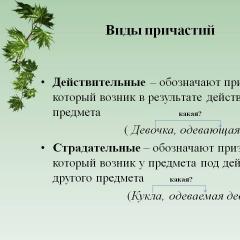Tip 1: How to distinguish a verb adjective from a participle
Instructions
Remember the definition "The participle is a special form of the verb that is not conjugated and denotes a sign by action (procedural sign)." Therefore, the participle can be replaced with a turnover with the verb from which it is formed. For example, a house that has been built is a house that has been built.
Differentiate between the verbal adjective and the real participle of the present tense:
- there is a dependent word. For example: eyes shining (from what?) With joy - communion;
- an adjective can be replaced with another adjective. For example: brilliant (participle) from the joy of the eye - brilliant (adjective) performances (brilliant performances - great, spectacular, successful, excellent);
- terms are always adjectives (typewriter);
- the particle does NOT reduce the verb, therefore the word is used already in the role of an adjective (inappropriate conditions - an adjective).
Distinguish between an adjective and a valid past participle:
- participles on –SHIY is often passed into adjectives (the past year is an adjective);
- participles, which are formed from the stems of intransitive perfective verbs, acquire a qualitative meaning and become verbal adjectives. For example: extinguished (from go out - intransitive perfective verb, adjective) eyes, but extinguished (participle) fire.
Differentiate between the verbal adjective and the passive participle of the present tense (in -MY):
- a word is an adjective if it is formed from a perfective verb and from intransitive imperfective verbs;
- a word is a participle if it is formed from a transitive imperfective verb;
- if there is a dependent word in the instrumental case (subject), then the main thing will be the participle. For example: toys not loved (adjective), toys not loved (participle) by a child (subject).
Distinguish between adjective and passive past participles:
- if a word can be replaced with a verb without changing the essence of the phrase, and substitute the dependent word in the instrumental case, then this is a participle (refined reserves - to find reserves, refined (by whom?) reserves by the chief);
- if you can replace with another adjective, apply degrees of comparison or form an adverb in -O from the word, then this is an adjective (refined manners - noble manners, extremely refined manners, exquisitely);
- distinguish the adjective in a figurative sense (open (passive past participle with the suffix -Т-) door - open (adjective) person).
Write with -Н- and -НН-:
-Н- in adjectives formed from imperfect verbs, without a dependent word (knitted hat);
-НН- in participles x, formed from imperfective verbs, with a dependent word (crocheted hat);
-НН- in participles x, formed from perfective verbs (tied (tie) jacket);
-НН- in verbal adjectives formed from imperfective verbs in -ОВА-, -EVA- (pickled cucumbers).
To find participle among other parts of speech, you need to know what distinguishes it from them. Firstly, it is a special form of the verb that denotes the attribute of an object by action. Secondly, it has the features of a verb and an adjective.
You will need
- 1. Words
- 2. The sacraments
Instructions
Find out what question the word answers. If the questions “what”, “what is doing”, “who did”, it is most likely participle.
In order not to get confused, you need to remember that participles, unlike adjectives, have signs of type, tense, and the properties of modality and transitivity are also applicable to them. Remember also that participles are derived from verbs, while adjectives are most often derived from nouns.
See what suffix a given word has. If these are valid present participles, then you will encounter the suffixes -usch-, -usch-, -usch-, -yasch. For example, the issuer. If these are the passive participles of the present tense, then these are the suffixes -em-, -im-. For example, released.
Identify valid past participles correctly. They are characterized by the suffixes -vsh-, -sh-. For example, who read, brought. For passive past participles, the characters are suffixes -nn-, -t-, -enn-. For example, drawn, offended, sung.
Learn to find the short participles as well. Passive participles form a short form. For example, we love. Remember that short participles always have one letter n.
Sources:
- "Modern Russian language", VA Beloshapkova 1989.
For example: lying without moving; were freezing, standing in the wind.
Participle and the participial turnover performs the function of defining in the sentence - single or widespread, agreed or inconsistent, isolated or non-isolated.
For example: Calm trees silently and obediently dropped yellow leaves.
The participles in a short form are used only as the nominal part of a compound predicate.
For example: Hair is silvered with early gray hair. The participle and the adverbial turnover act as different circumstances.
Turning pale, the dawn dies down (I. Nikitin).
Formal signs distinguishing between participles and gerunds are suffixes.
In school classrooms, all information about suffixes is summarized in tables that are posted on the walls. For convenience, they can be written out, for example, on the cover of a notebook.
Word-formation suffixes of real participles: -usch - (- yusch-), -asch - (- yasch); -vsh-, -sh-; passive: - ohm - (- em-), -im-; -enn-, -nn-, -t-.
Word-building suffixes of imperfect and perfect participles: -a-, -ya-, -uch-, -yuchi-, -v-, -vshi-, -shi-.
A participle is a special verb form that has both the properties of a verb and an adjective. From the verb, the participle has a form, transitivity, reflexivity and voice, and from the adjective - a change in cases, numbers and gender, as well as agreement with a noun. A participle, like an adjective, denotes a sign of an object.

Grammatical signs of the participle
As a special form of the verb, the participle has some signs of this part of speech. They are of a perfect and imperfect form: "to induce - prompted", "to agitate - agitated"; returnable and irrevocable: "decided", "falling asleep"; present and past tense: "thinking", "running".
Unlike the verb, the participle has no future tense.
Designating a feature of an object, the participle, like an adjective, grammatically depends on the noun and agrees with it in gender, number and case. For example: “boiling stream - boiling stream - boiling stream - boiling streams; boiling lava, boiling milk. "
Types and methods of forming participles
The lexical meaning of a participle - a sign of an object by action - is made up of the grammatical features of this part of speech. For example: "singing birds" (those that are singing now), "singing birds" (those that sang in the past), "discussion issue" (one that someone is discussing now), "discussion issue" (the one that which has already been discussed).
Accordingly, in the Russian language there are 4 forms of participles: valid present and past tense, passive present and past tense.
The first group of participles (valid present tense) are formed from the stem of the present tense verbs using the suffixes -usch- (-usch-), -asch- (-sch-). The choice of suffix depends on the conjugation of the verb. For example: "cry-ut - cry-uh-nd", "num-ut - num-nd" - I conjugation; “To lay down - to lay down”, “to lay down - to lay down” - II conjugation.
Actual participles in the past tense are formed from the infinitive by replacing the suffixes -ty, -ty with the suffixes -vsh-, -sh-. For example: "run-t-be-run-louse", "carry-t-s-s-s".
Passive participles of the present tense are formed from the verbs in the present tense using the suffixes -em- (I conjugation) and -im- (II conjugation): "cherish - cherish - keep -th ".
Passive past participles are formed from the base of the indefinite form of the verb using the suffix -nn-, if the verbs end in -at, -et. Verbs ending in –iti get the suffix –enn-, as well as verbs ending in –ti, –ch, and verbs ending in –t, –t-, –yt- get the suffix –t-. For example: "write - written-nn-th", "seize - seized", "save-someone - save-th-th", "forget - forget-th-th".
Short participles, like short adjectives, are the nominal part of a compound nominal predicate in a sentence.
Passive participles have a short form with truncated endings: -а, -о, -ы. For example: “sent, sent, sent, sent”.
Sources:
- verbal adjectives are


